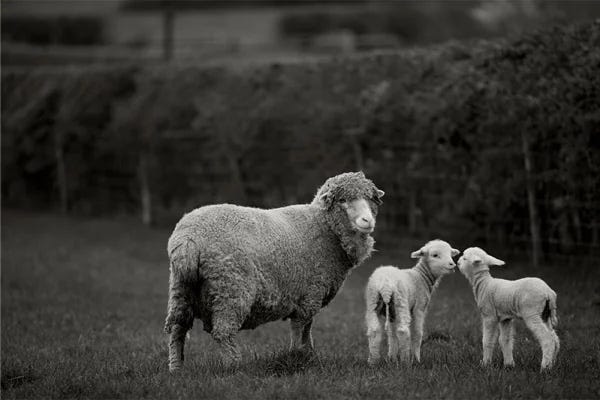The journey of our Home-grown Merino collection
GROWN, SHEARED, SPUN AND KNITTED IN THE UK.


Our Home-grown Merino knitwear collection was awarded the Positive Luxury Product Innovation of the Year.
Launched in November 2021, this collection was grown, sheared, spun and knitted in the UK, never having to leave British soil. The wool traveled no further than 639 miles from Daylesford Farm to our Bamford Store – a true representation of our commitment to sustainability.
The evolution of our Home-grown Merino collection
In 2022 we were delighted to welcome 12 new lambs to our merino flock, making the total number of lambs 58. We are so looking forward to the launch of our second collection which will be available to shop online and in-store in 2023.


OUR FARM. OUR SHEEP. OUR WOOL.
Bamford is proud to have launched a first-of-its-kind merino wool knitwear collection, made entirely from natural fibres that have been grown at Daylesford Organic farm in the Cotswolds, sheared, spun and knitted in the UK. The milestone collection is made from superfine merino wool that is 100% traceable from the farm where the fibres are grown, all the way through to the finished garments – without transporting overseas or across airways.
Transparency and a commitment to treading lightly is at the heart of this collection and we are proud to be championing UK wool and a longstanding British knitwear heritage. Follow the journey of the collection as it was made – starting from the origin story of our merino flock at Daylesford farm, following the fibres as they are transformed into garments, revealed in their final form as the first generation of the Bamford Home-grown Merino Knitwear Collection.


Tread lightly, shop consciously.
‘Our aim at both Bamford and Daylesford has always been to minimise our environmental impact and give back to nature where we can. The home-grown merino project has allowed us to take that vision one step further: to create a product with a fully traceable profile that not only eradicates waste and has a positive impact on the climate, landscape and airways – but unites Daylesford’s expertise in sustainable, organic farming with Bamford’s skill in designing knitwear.’
639 miles. That's all.
The average supply chain for a merino sweater is 18,000 miles – that’s 30 times the length of the UK. Our Home-grown Merino wool travels no further than 639 miles from farm to shop.
READ ON TO FOLLOW THE JOURNEY.
The first shearing
DAYLESFORD FARM, COTSWOLDS, UK
The first-generation of merino sheep were introduced to Daylesford farm in Gloucestershire in November 2019, relocated in close collaboration with the UK's only pedigree merino farmer based in Devon. Daylesford work at the forefront of the organic and regenerative farming movement, and the flock benefit from the highest standard of environmental and animal welfare on the farm.
'It was a tough challenge to find merino sheep as the number of flocks in Britain is very low. We eventually tracked down the line of Saxon merinos that are well suited to being reared in Britain and we are delighted to be raising the sheep here, producing this fine-quality wool for the Bamford collection.’
RICHARD SMITH, SENIOR FARMS MANAGER, DAYLESFORD ORGANIC
The 10 ewes that were introduced to the farm have since had two successful lambing seasons in Spring 2020 and 2021, and we are expecting to triple the size of the herd in the coming years. Merino sheep are raised primarily for wool production, and the herd at Daylesford will be bred only for their luxurious wool.
MERINO SHEEP: DID YOU KNOW?
- Daylesford have been farming organically for over 40 years and share in the vision for sustainable living of our shared founder, Carole Bamford.
- The merino breed we are farming is the Saxon merino which was farmed by the Saxons hundreds of years ago in Northern Europe and England, before being shipped over to New Zealand in the 19th Century.
- Merino sheep are strong and hardy animals. They are well adapted to almost all climates and they are excellent foragers. A healthy life expectancy for a merino sheep is 5-6 years.
- Merino lambs are born in March, and merino sheep tend to have twin lambs. After two lambing seasons in 2020 and 2021 we now have 38 merino sheep in our flock.
- The sheep need to be sheared at least once a year and their fleece is constantly growing all year round, making it a completely renewable fibre option.
The first shearing
DAYLESFORD FARM, COTSWOLDS, UK
The wool that merino sheep produce is perfectly suited to be used for clothing owing to its natural softness and self-cleansing properties. Their fleece grows annually in between shearings, making it a fully renewable fibre option. These inherent characteristics are unmatched in any other natural fibre and are why we have returned to the fibre again and again in our clothing collections.
The first two shearings of the mature merino sheep took place at Daylesford in Spring 2020 and 2021, producing 124kg of woollen fleece in total across the two years. It is expected that one third of the fleece weight will be lost during the spinning process, as unusable fibres are separated from the useable wool. We intend to rescue the unusable fleece and to repurpose it in multiple ways to minimise waste resulting from the process, including composting waste fleece to be used on the Daylesford Market Garden.
DID YOU KNOW?
- A mature merino sheep will produce approximately 2.5-3kg of fleece per shearing. This fleece will then regrow annually after shearing, making it an entirely renewable fibre option.
- The diameter of any fibre is known as its micron, and these are the measurements by which fibres are categorised into Fine, Medium and Broad categories. For reference, one micron is equal to one millionth of a metre (the average human hair is between 50 to 100 microns).
- Wool from merino sheep can range between 17 to 80 microns. The merino wool sheared from our Saxon Merino sheep at Daylesford farm is a superfine wool at around 17.5-19.5 microns – roughly equivalent to cashmere, and therefore perfectly suited for garments that will sit softly against the skin.
Spinning the yarn
PENNINE HILLS, UK
We acquired 124kg of 'greasy fleece' that needed to be processed, which refers to the raw wool as it comes straight from the sheep. A portion of this weight will be lanolin, the natural grease of sheep’s wool, and also a small amount will be vegetable matter that may have got matted in the sheep’s fleece from foraging on the farm, brushing against hedgerows, or bedding down on hay in the winter.
There are several processes that happen prior to the spinning process including scouring (cleaning) the fleece, as well as blending and carding the fibres to prepare them.
The spinner we are working with is a 3rd generation family-owned company in the southern Pennine Hills, with over 70 years experience in spinning fine woollen yarns. Our yarn fibres have been left undyed to celebrate the natural colour of the wool, which also reduces water consumption and protects British waters.
SPINNING: DID YOU KNOW?
- We encountered delays with the processing and spinning stages of our merino wool as the fleece had a lot of vegetable matter in it, consistent with farming sheep in the UK. For spinning a ‘woollen’ knitting yarn, the fleece must be very clean and vegetable matter free.
- The vegetable matter that was removed from the fleece before spinning will be composted for use on Daylesford farm, to nourish the soil for future generations of growth.
- After spinning, we had a total of 61.3kg of spun woollen yarn to use for our collection.
- By leaving our yarn undyed, we have reduced water consumption by 12,000 liters - that's equivalent to 35,000 cups of tea.
Knitting the collection
THE SCOTTISH BORDERS, UK
Bamford have always relied on the generations of expertise that mark out knitwear production in Scotland and want to see that knowledge survive into the future. The knitting of the first Home-grown Merino collection was entrusted to Bamford’s longstanding knitwear partner located in Annan, Scotland. There is an enduring commitment on both sides of the partnership – not only to create long-lasting, inherently beautiful knitwear, but also to extend the lifeline and legacy of a cultural heritage rooted in small-scale family businesses.
Our choice to work with Scottish producers ensures us quality that is unrivalled. The knowledge and understanding of wool and its intricacies and fluctuations is unique, and while historic methods are increasingly being forgotten in favour of automated manufacturing, there is a value in the traditional means of spinning yarn, hand-linking garments and the choice of timeless stitches that allows Bamford to create long-lasting, inherently beautiful knitwear.
KNITTING: DID YOU KNOW?
- At its height, the Scottish knitwear industry employed more than 9,000 people. Today, a cultural heritage rooted in small-scale family businesses is in danger of being eroded and the unique qualities and skills that come with producing knitwear in Scotland may become a distant memory.
- In 2021, 50% of our total knitwear collection styles are made in Scotland.
- The secret to achieving supremely soft knitwear made in Scotland is the purity of its waters. The exact PH balance to the soft water ensures knitted items have an incredibly soft handle which makes the Scottish knitwear industry synonymous with quality.
